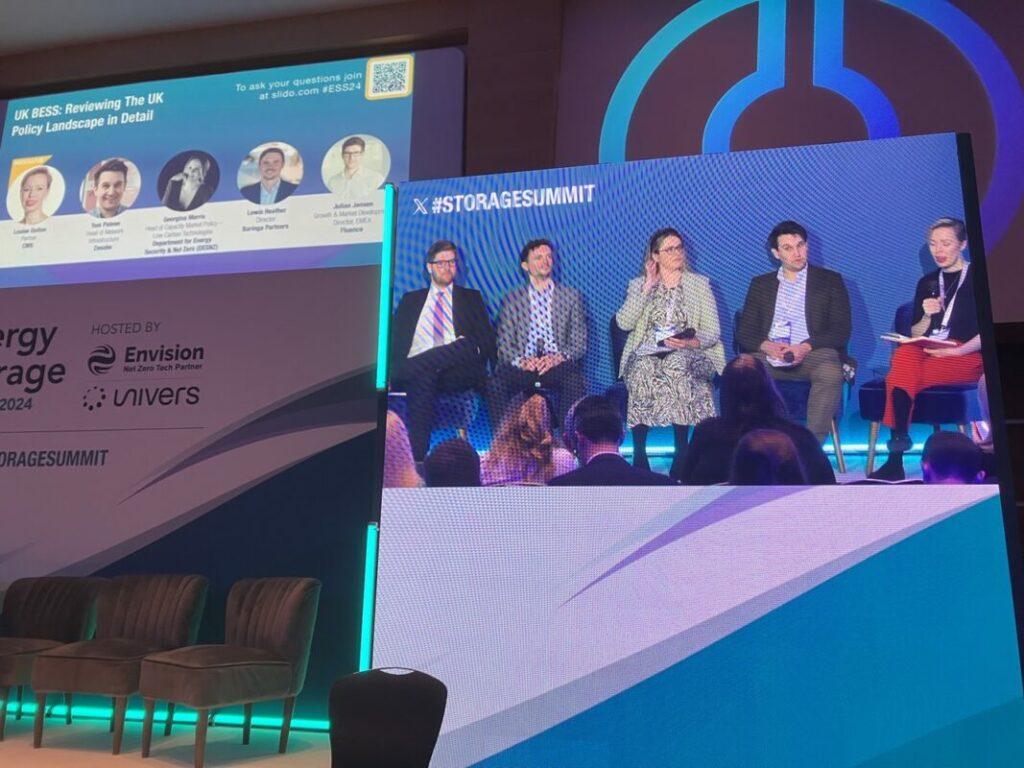
This Friday Briefing wants to know where the people who translate clean energy ambition into reality will be coming from, and the UK BESS industry sails on.
‘Everybody wants the same people’
Industry veteran David Hunt, CEO of specialist clean energy recruiter Hyperion Executive Search, is among those who have attended most, if not every, London edition of the Energy Storage Summit since it began nine years ago.
Enjoy 12 months of exclusive analysis
- Regular insight and analysis of the industry’s biggest developments
- In-depth interviews with the industry’s leading figures
- Annual digital subscription to the PV Tech Power journal
- Discounts on Solar Media’s portfolio of events, in-person and virtual
I chatted with him this morning to get some of his observations on the show, but actually, it was a pretext to ask someone with skin in the game what they thought about one of the industry’s biggest challenges.
Hyperion is currently recruiting executive and senior roles across a few geographical markets and technologies. That includes some of the European battery manufacturing startups like Verkor, silicon anode, and other battery materials and component groups, as well as companies further downstream and across different technology sets.
In Europe and in the US’ rapidly growing markets, finding enough of the right people to hire has been widely cited as a major challenge for the industry.
Hunt says a big proportion of the employees and execs he places for clients are sideways moves from other companies within the same sector, with BESS and related areas accounting for roughly 40% of Hyperion’s placements.
That’s great for his company because it means salaries go up, and so does the commission, but it also means that the talent pool is a limited one. There are also many hires coming in from other industries, most likely ones that feel somewhat adjacent, such as telecoms or oil & gas.
Still, for the most part, and perhaps understandably, it’s people with relevant experience that are most sought after. Obviously in a new and scaling industry, that’s a limiting factor.
Some of the more ‘boots on the ground’, blue collar or technical roles are also desperately short of people, with Hyperion finding that project designers in particular are a highly valued human resource.
“Everybody wants the same people. That’s a blessing and a curse for us, because on the upside we know we can place them,” Hunt says.
“On the downside, from a market perspective, everybody’s after the same people and it’s a challenge for companies and for us to help companies to bring some transferable skills into the business.”
The market isn’t getting any smaller while the talent pool isn’t scaling up at the same pace, he said.
“It’s also timing – we know how quickly the market moves. Particularly in the startup environment and smaller companies, they don’t have time or resources to be training people, they just want someone ready and ‘off the shelf’.”
One to watch, and a hard one for the industry to get to grips with. It’s good news if you’re looking for a new challenge that feels familiar, I guess!
Rumours of UK BESS market demise exaggerated
The Energy Storage Summit is almost as old as Energy-Storage.news, with the site’s launch preceding just a year (Happy 10th Birthday to us!) before.
In that time it’s grown from around 300 delegates – which at the time seemed ambitious – to more than 1,500. That’s not as many as the 1,900 figure tweeted by the UK’s climate and energy minister, Graham Stuart immediately after his opening keynote, but it’s still pretty good.
While it began almost exclusively as a UK show, the focus has broadened and the ‘EU’ suffix added to the name. And this year, it really lived up to that. While there was rightly still a major UK focus, it was amazing to see people coming from around the world to share, learn, educate and of course do business.
At the same time, and you will likely have heard already, the UK market has been in a period of low revenues these past few months. One source even suggested ahead of the event that a market collapse is imminent and that the show should be called off for 2025.
That seemed a little premature, and while there are valid concerns over some of the major challenges, like low revenues and slow grid connection queues, we heard that the UK industry is ready to deal with it and the fundamental drivers are in place to overcome.
Germany-based clean energy industry strategic consultant Florian Mayr of Apricum stopped by to speak with Energy-Storage.news and said that while he had expected to find a bearish atmosphere, the venue’s assembled UK folk were a lot more optimistic and ready to do business than that.
So, yes, revenues may be down, and project valuations too, but new business models to meet new opportunities, as well as refinements of the existing ones, mean that rumours of a UK market demise have been greatly exaggerated.
While the show was taking place, the T-1 Capacity Market auction results were revealed by electricity system operator National Grid ESO. Batteries, with just over 650MW of contracts awarded, were the most successful among low-carbon technologies.
And as Georgina Morris, head of capacity market policy – low-carbon technologies at the UK government Department for Energy Security and Net Zero (DESNZ) said at the conference, it will be a nice uplift of contracted revenues for developers and investors.
That’s obviously to be welcomed, but with the UK industry having pioneered revenue stacking across multiple market opportunities, it’s the ability to be nimble and flexibly adapt to all the merchant revenue streams available, that mean the market will drive on forward.
Happy Friday!
This week on ESN Premium

The Q1 2024 edition of our downstream solar PV and energy storage journal, PV Tech Power, is now available to download. This issue focuses on looming PV module quality issues in the face of an extreme price crunch.
As always, ‘Storage & Smart Power’, the section of the journal contributed by our team at Energy-Storage.news, returns. Subscription to PV Tech Power is included in your ESN Premium subscription package, including access to nine years of back issues of great content.
We catch up with the president of Canada-headquartered Hydrostor, Jon Norman, about the firm’s advanced compressed air energy storage (A-CAES) tech, current projects, future plans and being a developer versus system integrator.
Hydrostor is deploying projects in the US and Australia using advanced compressed air energy storage (A-CAES) technology utilising “off-the-shelf” components. Goldman Sachs Asset Management committed to investing US$250 million in the company in 2022, and Hydrostor is the investor’s “global LDES (long-duration energy storage) play”, Norman says.
We caught up with James Li, European energy storage director of inverter and BESS provider Sungrow, at the Energy Storage Summit EU 2024. Li was a speaker on Day 1 of the two-day event put on by our publisher Solar Media in London this week (20 and 21 February).
In this interview conducted on-site, he discusses last year’s challenges, what is happening with battery energy storage system (BESS) prices and the company’s priorities for future technology improvements.
The inverters at an upcoming 300MW/600MWh battery energy storage system (BESS) project in Scotland, UK, will enable the asset to deliver inertia that is “essential for the grid to function efficiently”.
Referring to the company’s latest contract award from repeat customer Zenobe Energy, Andy Tang, head of Wärtsilä Energy Storage & Optimisation (ES&O), told Energy-Storage.news Premium that the South Kilmarnock BESS will provide stability services including “true synthetic inertia” and Short-Circuit Level system voltage management.

